MELODY MAKER (1941)
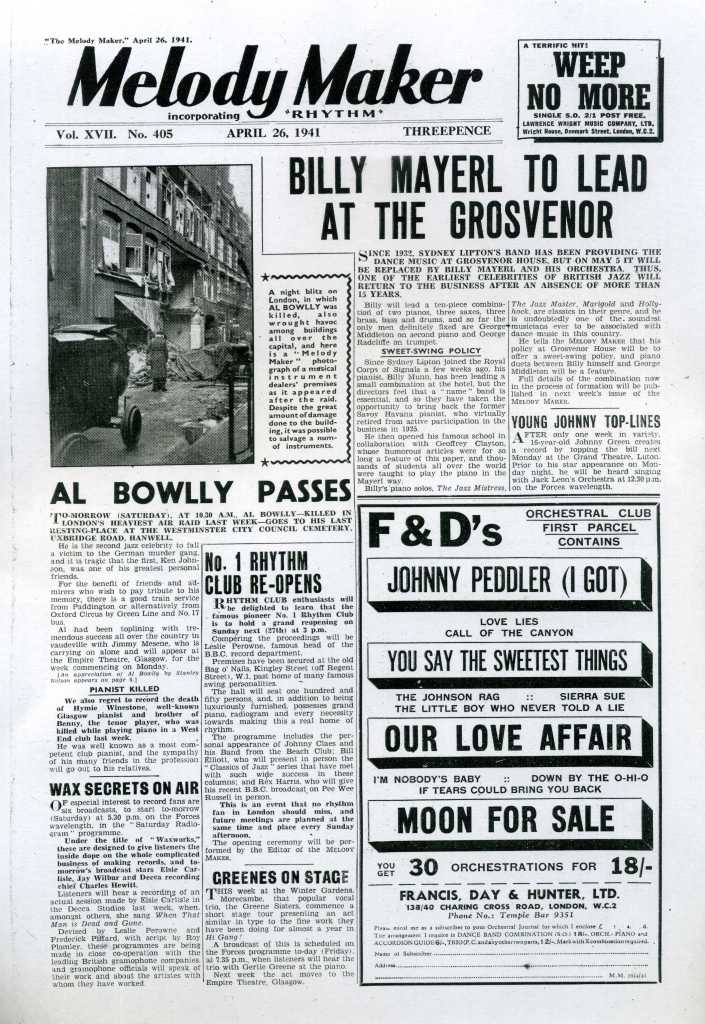
“Tomorrow, Saturday, 26th at 10.30 a.m., Al Bowlly, killed in London’s heaviest air-raid last week, goes to his last resting place at the Westminster City Council Cemetery, Uxbridge Road, Hanwell. He is the second jazz celebrity to fall a victim to the German murder gang, and it is tragic that the first, Ken Johnson, was one of his greatest personal friends. For the benefit of friends and admirers who wish to pay tribute to his memory, there is a good train service from Paddington, or alternatively from Oxford Circus by Green Line, and No. 17 bus. Al had been top-lining with tremendous success all over the country in Vaudeville with Jimmy Mesene, who is carrying on alone, and will appear at the Empire Theatre, Glasgow, for the week commencing on Monday”. (An appreciation of Al Bowlly by Stanley Nelson, appears on Page 4 of Melody Maker) — (Reprinted below).
SAY, DON’T YOU REMEMBER, THEY CALLED ME AL ?
The above lines, from his famous signature-tune, Buddy Can You Spare a Dime ? might well be the epitaph of one of the finest singers British jazz has ever known, and whenever they are heard in the future they will always recall a lithe, muscular, bright-eyed figure “selling” his songs in a way that has never been excelled and rarely equalled by a Britisher. I have watched Al Bowlly’s career ever since he came here from Germany in 1928 as vocalist and banjoist to join Fred Elizalde’s Band at the Savoy Hotel. I have seen him rise from obscurity to international fame and when I met him last, only a few days before he was to lose his life in the latest Luftwaffe murder raid on London, it was forcibly brought home to me just how unaffected and natural he had remained all through the years. I thought then that he seemed troubled inwardly, under the bright optimism which flowed from him, and now I know that his hypersensitive, emotional nature had received a shock which all his laughs couldn’t hide.
PROPHETIC LETTER
While he was playing a theatre date in the Midlands a week or two ago, he received a letter from someone who told him that she had dreamed that she had seen him talking to a black man and suddenly he had been blown to pieces ! Possibly the more stolid and unemotional of us would have dismissed this, but Al was of a superstitious nature, and was plainly worried; all the more, because the very morning he received the letter, he also heard that one of his closest friends, Ken Johnson, had been killed.
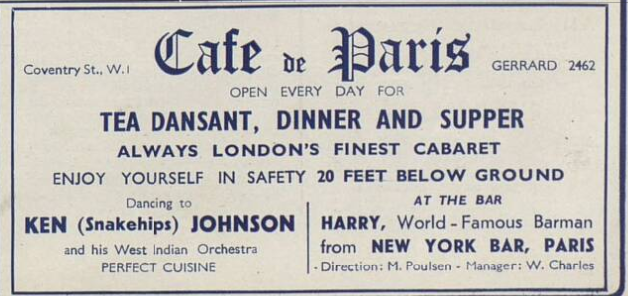
He confessed to the “M.M” Scunthorpe representative, Jack Whitfield, with whom he was on terms of intimate friendship, that he believed that it was a warning to him. He freely admitted that the remarkable coincidence worried him. It was some time after this when I met Al in Denmark Street, but he hadn’t rid himself of this fear and the third and concluding link in this appalling chain of circumstances has now been completed.
Al would have wanted to leave behind him a reputation not merely as a great jazz singer, but also as a man. I can say now that he was considerably older than most people suspected, and that only his remarkable enthusiasm for physical well-being and rigid adherence to exercise gave him a virility and a perennial freshness which belied his long experience in the business.
The homage of everyone with the welfare of the British jazz at heart must go out to this South African of Greek descent, who rode to world fame with those great recordings which Ray Noble made with the New Mayfair Orchestra. Those discs forced the attention of America to Britain’s jazz amd culminated in Al going to the States with Ray Noble and Bill Harty.
DOUBLE ACT
Although he was a terrific success in America, Al didn’t care for the life there and he eventually returned home where the legions of fans who had listed rapturously to his singing with the great Lew Stone Band at the Monseigneur Restaurant soon had the opportunity to hear him in the flesh. For some years Al toured all over the country as a single act, but recently he had been for some time in partnership with Jimmy Mesene, and this had become one of the biggest vocal acts in variety.
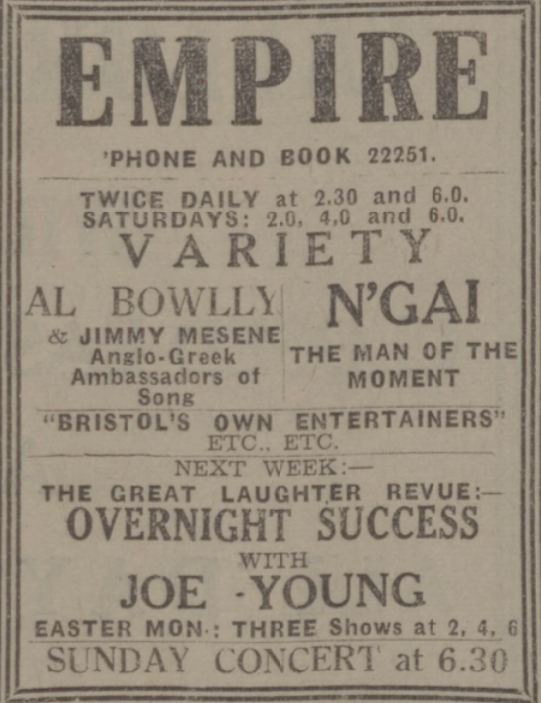
Al and Jimmy were appearing at the Rex Theatre, High Wycombe, last week, and Al came back to his West End flat and went to bed during London’s worst blitz. Reading in bed, he was killed —Tragically enough, not by a direct hit on his house, but by the blast from a bomb which demolished much of the street a few yards away.
There were many good judges, and the late “M.M.” cameraman Jack Butterworth was one of them, who considered Al Bowlly the greatest rhythm singer this country has ever had. Concentrating as he did in late years on variety work, present-day swing fans probably only knew him as a singer of pop songs. But to the older fans, his pioneer singing with Elizalde, Lew Stone , Syd Lipton and other leaders, will always be one of the brightest features in the small British constellation which had a very real place in the world firmament of Jazz.
We in the MELODY MAKER office first learned of Al’s tragic end late on Thursday afternoon, when a Press Association “flash” brought the news over the tape. It was thus too late for us to carry it in our last week’s issue, for the paper was already off the machines, ready for distribution on Friday The dailies carried the story the next morning, and immediately our ‘phone bell started to ring, and continued ringing most of the day, from admirers of Al all,over the country, only too ready to believe that it wasn’t true. It was an astonishing proof of the tremendous esteem in which he was held, not in the profession but amongst the general public.
GREAT- HEARTEDNESS
It was an index, too, of the man’s own great-heartedness. I have never met Al Bowlly without feeling his own innate sincerity, without realising that his destiny in this world was to charm people with his voice, and to lift them for a few moments out of the drabness of their workaday lives. Al really lived for his job. He lived and dreamed of it, and nobody was more conscious of the debt he owed to his Maker for giving him the gift of song. There have been times when I have smiled at the rather melodramatic way in which he would throw up his arms in the street and say “Thank God, It’s terrific !”, when I asked how his act was going.
Now I know that behind the facade which we knew as Al Bowlly was a deeply religious man. Know that he carried a message of destiny, and if there are any among you who might feel that a description of a singer of popular songs hardly warrants such a conclusion, let me tell you just one more astonishing fact in this awful story. The very last record broadcast by the BBC of Al singing, was the one in which he sang with Ken Johnson’s Band …….
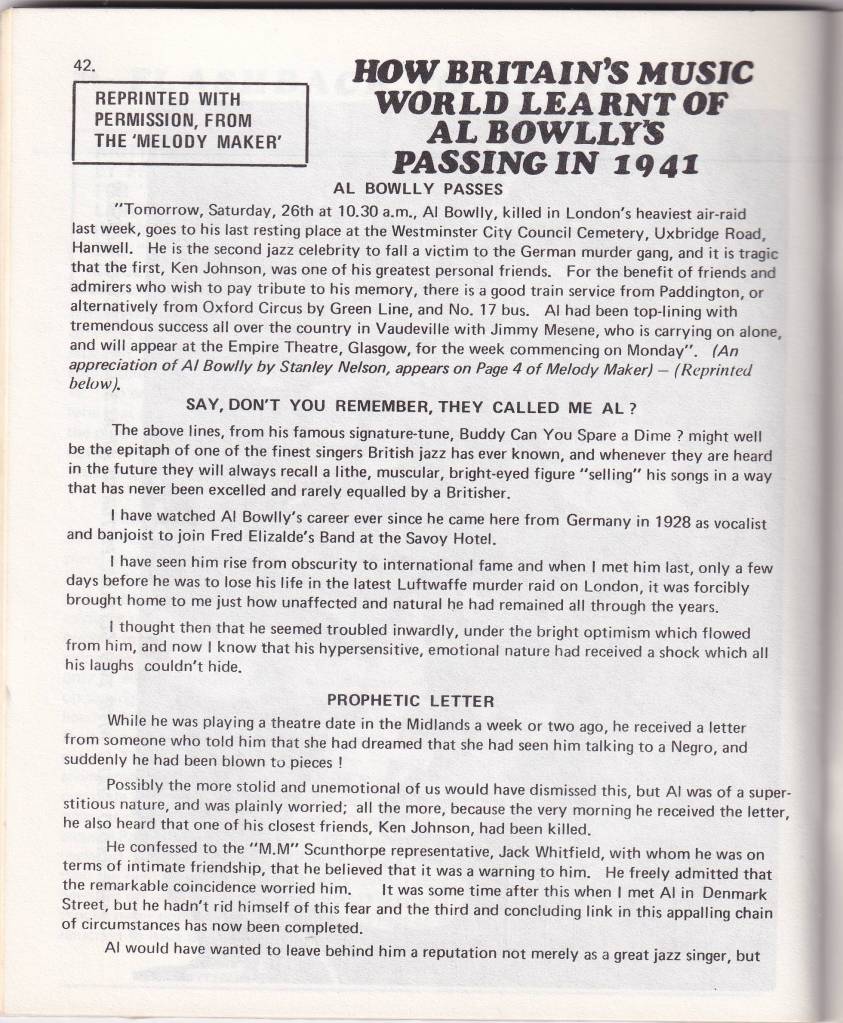
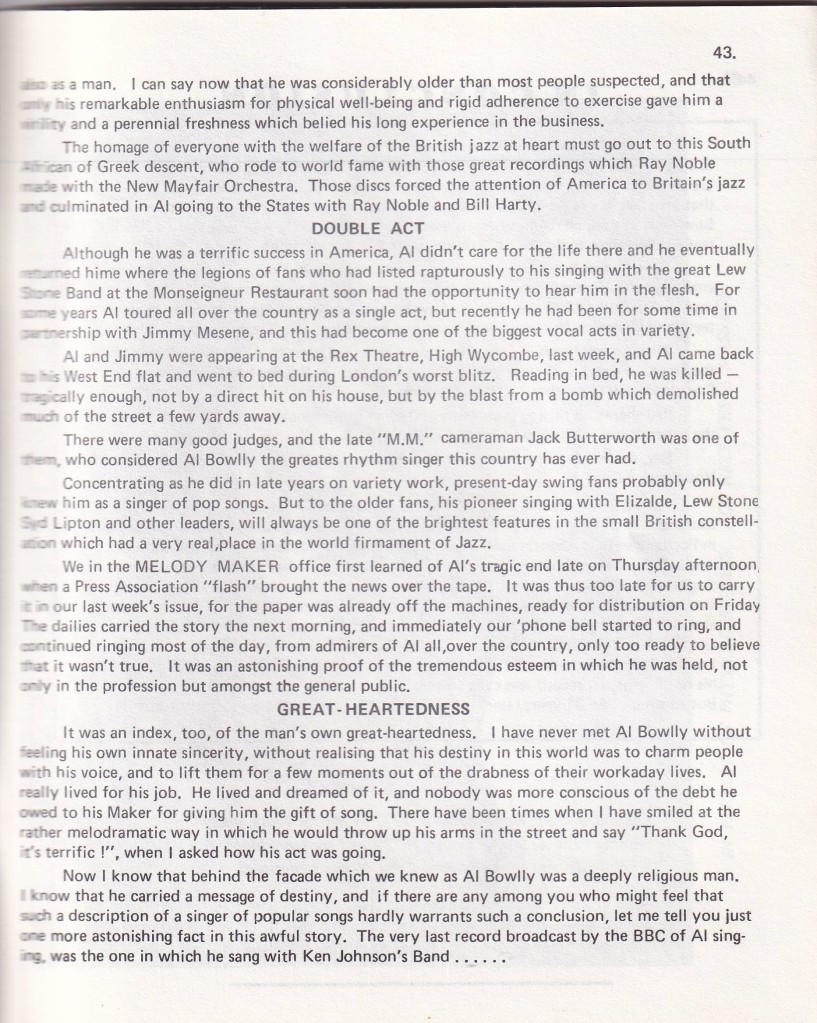

This is a very moving tribute to Al. I was touched to read that so many people telephoned the Melody Maker magazine’s office when reading the news of Al’s passing in the paper, hoping so much that the news was incorrect. It’s gratifying to know that he was loved and missed. And here we are today in the 21st century, a new generation of listeners loving his voice and having affection for him.
LikeLike